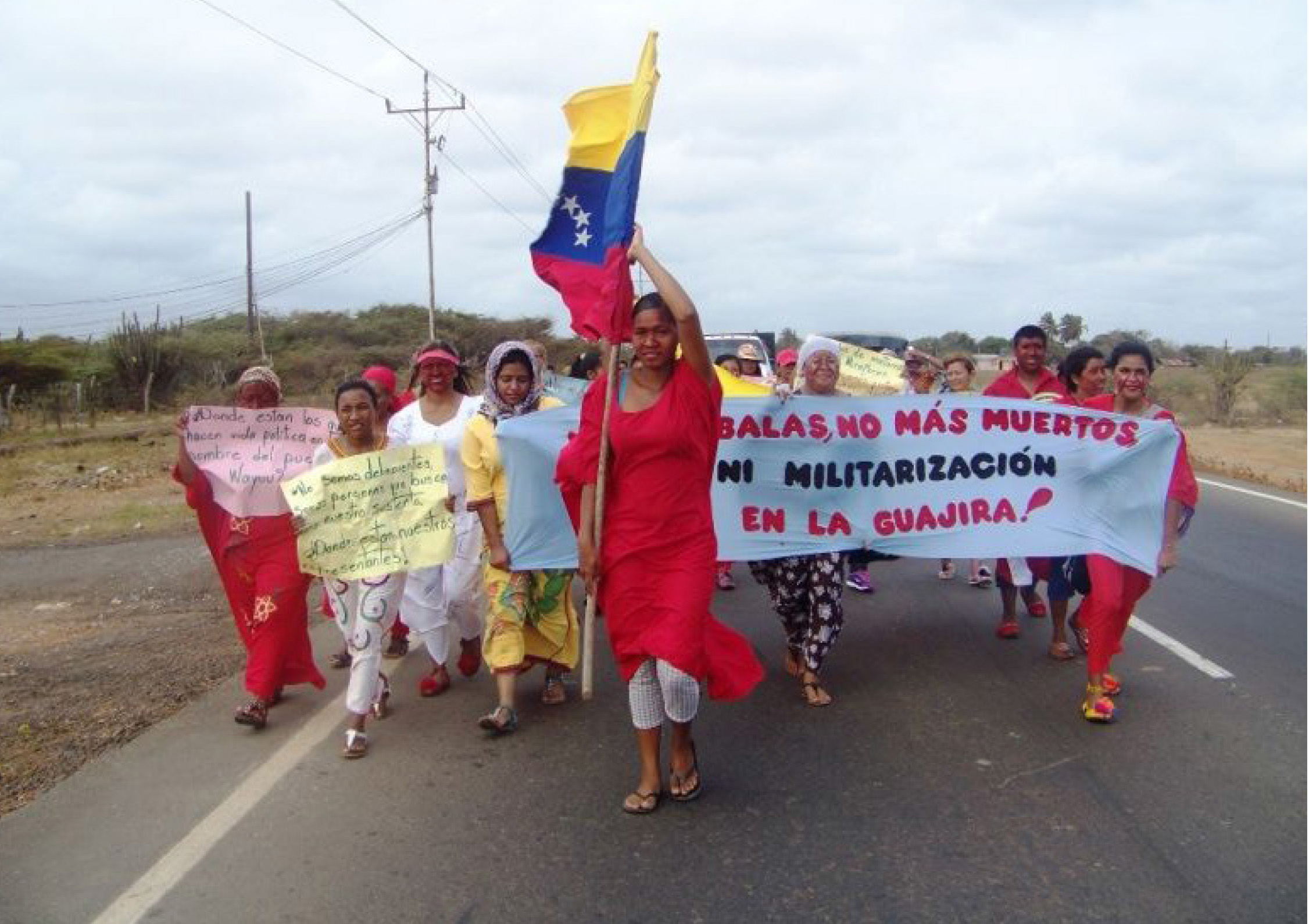The Venezuelan NGO Red de mujeres constructoras de paz (Network of Peacebuilder Women) presented the second edition of its annual report Las más jóvenes, las más vulneradas (Youngest women, most vulnerable), which studied the effects of the Venezuelan crisis on women aged 18 to 24 years old during 2023.
The study covers the topics of sexual and reproductive health, access to education and health, and women’s participation in their communities and political parties, as well as gender-based violence and migration.
The report was prepared through the testimonies of more than a thousand young women from 13 states in the country. Amid the complex crisis affecting Venezuela, women aged 18 to 24 are cornered by a series of challenges that restrict their access to health, safety and opportunities.
The scarcity of basic resources and precarious economic conditions put young women in a situation of dependence on their families and make them vulnerable in the face of economic hardships at home.
The report also points out that misinformation on sexual and reproductive health puts young women in a particularly vulnerable situation, especially in the case of teenagers, who are exposed to unwanted pregnancies due to their lack of access to health care, contraception and education.
Lawyer Jennifer Jardim specified that the figures offered by the Center for the Study of Sexual and Reproductive Rights (Cedesex) suggest that, while teenage pregnancy rates in Latin America average 67 per 1,000, the indicator is 50% higher in Venezuela, with 97.7 pregnancies per 1,000 teenage girls.
“For this reason, it is not surprising that between 2022 and 2023, Venezuela has been the country with the highest rate of teenage pregnancies in the region,” the report notes.
In addition to the analysis of these topics, the researchers also presented recommendations for the protection of women and mechanisms to resolve the problems that affect the most vulnerable women.
To achieve this, they point out the need for strategies to step up assistance for women and girls in a situation of vulnerability and victims of violence alike, as well as educate them on sexual, educational and political rights.
The Report
The Venezuelan crisis has exerted a disproportionate impact on the lives of young women, affecting not only their current well-being but also their future and full development. These women and girls have grown up in a hostile context, in a country with generalized shortcomings and a State that fails to provide guarantees for their access to education or health. They are part of a generation marked by the migration of their loved ones.
In a previous report by Red de mujeres constructoras de paz under the title Mujeres que resisten: sobrevivir a una Venezuela en crisis (Women who resist: surviving a crisis-ridden Venezuela) the researchers found that one of the main factors that made women a vulnerable population in these contexts was related to sexual and reproductive health. This comprises the lack of access to thorough sexual education and contraception, as well as family planning programs and gynecological and obstetric care This situation is generating unwanted pregnancies, which negatively affect women who have to take care of the children.
In 2023, the researchers took a step forward to show that girls and women experience a double impact when it comes to the lack of sexual and reproductive health care since most of them do not have the economic and emotional resources and social support to take care of their offspring. They are also abandoned by a State that does not recognize the problem and therefore fails to provide measures to address it. However, the differentiated impact does not occur in this field only.
Delving into the problems that affect women shows that most of them affect younger women more deeply because of the way they grew up or are growing up. Although the term young women can be interpreted in different ways, the study focused on women aged 18 to 24 years old, understanding that they are part of a generation that was born and raised under the current political system and could fairly reflect its consequences.
This report, the second prepared by Red de mujeres constructoras de paz, was compiled under the absence of official statistical information, in a country where the last census was carried out in 2011. The figures presented in the document were collected through the efforts of several organizations.
This work seeks to document the current situation and raise awareness about the urgent need for measures that provide support and opportunities to young women and girls in Venezuela by recognizing their potential as agents of change and development in the reconstruction of the country. This report reflects reality not only through the analysis of a survey but also through testimonies and articles written during the year by the team of journalists at the network.
Red de mujeres constructoras de paz is an alliance of community leaders, activists and journalists in Venezuela, which aims to contribute to the recognition and visibility of gender inequality and also to raise awareness about fundamental issues related to women.
Executive Summary
The report analyzes the situation of Venezuelan women based on the responses of 1,112 women of different ages and socioeconomic situations, from 13 states of the country (Anzoátegui, Barinas, Bolívar, Carabobo, Delta Amacuro, Distrito Capital, Lara, Mérida, Portuguesa, Sucre, Táchira, Yaracuy and Zulia). A team of journalists and activists at Red de Mujeres Constructoras de Paz then organized and complemented the findings of the survey.
In terms of sexual and reproductive health, the study found that 42% of women aged 18 to 24 years old do not use contraception. 9% of them mention high cost as the main barrier while another 9% cite lack of access to medical consultations as the fundamental reason. This shows a notable variation from last year when the figure reached 70%.
Another aspect that illustrates the differentiated impact of the crisis on young Venezuelan women is that 47% of them affirmed having missed school or work due to menstruation, mainly because of pain, but also the lack of access to menstrual products and water.
Gender stereotypes and gender-based violence were also addressed in the study. The identification of sexist behaviors, as well as the different forms of gender-based violence, continues to be a pending task in the country. For example, 40% of the women surveyed do not consider cat-calling a form of sexist aggression.
Likewise, four in every 10 women identified themselves as victims of gender-based violence. Most of them mention psychological and physical violence as the most common manifestations. Economic violence came in third place. However, younger women are more likely to identify themselves as victims of sexual violence, as this type of gender-based violence comes third in the age group 18 to 24, together with economic violence. One of the most alarming aspects is that almost half of the young women surveyed do not know where to turn if they experience gender-based violence.
Regarding education, the outlook is dark. 98% of families with at least one girl or young woman of school age indicate that, although they are enrolled in school, the attendance is irregular. 62% of them attend class every day, a figure that stood at 68% just one year ago. 31% go to school just three times a week, and 6% say they attend only twice a week. In households in lower socioeconomic sectors, the percentage of girls and young women who attend school every day drops to 49%.
58% of the surveyed stated that the reason for missing school was the suspension of activities by their learning centers, with the lack of teachers being the second most mentioned reason, affecting 17% of all girls and young women. Lack of food is the third reason, mentioned by 7% of all surveyed households.
Interestingly, 6% of girls and young women in households in lower socioeconomic sectors stopped attending school because they had to work at home or outside. Although they refer to it as “supporting their homes”, they are speaking about unpaid domestic work.
Regarding the political and community participation of Venezuelan women, the findings are not encouraging either. While the general percentage of women who participate in political or community activities stood at 25%, the percentage drops to 14% among the age group 18 to 24, which reveals a clear lack of interest in these activities among this group. This represents an important change from last year when political and community participation stood at 25%.
This indifference becomes obvious when the following elements are analyzed. Women were asked whether they considered taking part in democratic activities important. While 68% of all women answered yes to the question, the percentage dropped to 51% among younger women. This means that half of young women do not see relevance in the elections, for example, which makes sense given that 50% of them are not even registered for voting. In fact, only 5% of them plan to participate in the next presidential elections.
A final point to highlight has to do with the impact of migration on women. 65% of the women surveyed affirm having at least one member of their family who migrated. Among young women aged 18 to 24, the figure decreases to 54%. One revealing finding is that 23% of young women in this group confirmed having one parent or both living abroad. They also overwhelmingly state having at least one brother or sister who has migrated (63%). This indicates that many of these young women are growing up without a role model at home.
Download the full report in Spanish HERE.
Translated by José Rafael Medina




